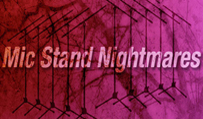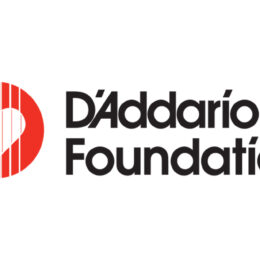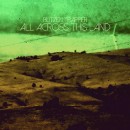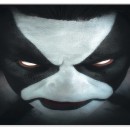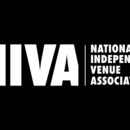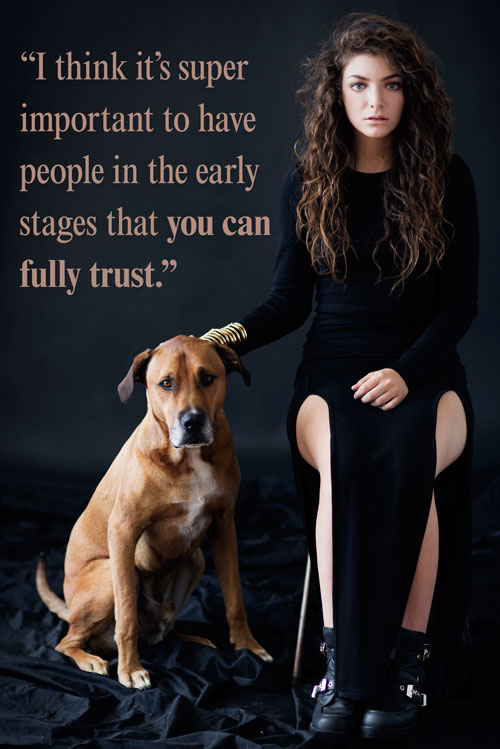
How did young New Zealand singer-songwriter Ella Yelich-O’Connor blossom into the smart, soulful pop sensation better known today as Lorde? A little help from Duffy’s 2008 hit “Warwick Avenue” set off a spark when Yelich-O’Connor performed the euphonious tune at a middle-school talent show five years ago. Captured that day on tape, Yelich-O’Connor’s mesmerizingly profound harmonies soon caught the ear of A&R rep Scott Maclachlan at Universal New Zealand, which is when the wise-beyond-her-years teen from Devonport took on her regal stage monicker. Today she is a remarkably poised 17-year-old whose record-shattering single “Royals,” from her debut album Pure Heroine, has reigned supreme on Billboard’s Hot 100 chart for several consecutive weeks. Despite her whirlwind schedule of appearances, Lorde took some time to talk with Music Connection about her skyrocketing career, her stubborn independence and the value of having a trusted team to support her.
By Danica Bellini
Music Connection: What is it like balancing life as Ella Yelich-O’Connor, the teenager who likes to go out and have fun with her friends, and Lorde––this new pop sensation currently breaking insane records on the Billboard charts?
Lorde: How can I put this––obviously I work and I work hard. I’m busy for a while, but then I go home and I muck around. I don’t feel that all this stuff has changed me that much in that respect. I still, you know, screw around and have fun. I don’t feel like it’s too hard to balance… um… this is a hard question to answer! I’m like, thinking out loud here.
MC: You were spotted by a talent scout when you were just a 12-year-old. Did you have any aspirations to be a pop singer at the time?
Lorde: I didn’t have any real desire to be taking music seriously, because I was 12, you know? But I sang in my school’s talent show with a friend, Louie, and his dad sent the tape to a record company, and they were really interested in my voice. My parents were super annoyed––this record company was pumping us and I didn’t really know what was going on.
MC: We’re assuming that your relationship with Universal eventually grew from there. Were there any other record companies trying to cut a deal with you instead?
Lorde: No––I’m pretty sure it was just Universal. Because all I really had was “the voice,” I wasn’t looking for anything more. Universal just caught me at a very, very young stage.
MC: Must’ve been a lot to take in as a kid. How was your support system at this time?
Lorde: I mean, I’ve been working with my manager since that age. The person who connected me with the record company [Scott Maclachlan] is now my manager. The team is kind of like family in some ways: we’re very close and we trust each other. I think it’s super important to have people in the early stages that you can fully trust. My manager is totally on-board with all the crazy stuff that I want to do and all the weird ways I want to market myself and all that. It really helps.
MC: Were you starting to work with producer Joel Little around this same time? It seems like the creativity really started to flow when you guys linked up.
Lorde: I actually started working with Joel later on. I’d already been working with the record company for three years and I already knew what was happening by then. The thing with me and my record company is that I’ve always had a huge role and I’ve always had a lot of control. I have never been afraid to speak my mind or tell them “I’m not doing it like this; I want to do things like this.” And they’ve always been incredibly supportive of that, so it’s never been difficult for me to kind of navigate the record label situation, I guess.
MC: Having that freedom must be great. It’s important to not have your individuality buried by the industry that’s supposed to support you.
Lorde: Yeah, absolutely! I think it’s because I lived in New Zealand. I’m pretty sure the same thing wouldn’t have happened if I’d been living in America.
MC: Interesting point. Compared to other pop stars, your talent is so pure and real. How does Universal encourage and support you to maintain this passion while still trying to boost your worldwide success?
Lorde: Oh, that’s a good question. Obviously, first and foremost I care about the art that I’m making––I try as hard as I can to keep that pure and not tainted with all the things that come along with having a big song. The record company kind of helped me to find a balance between having that complete purity with your art and also trying to make sure that you make the most of what’s happening. That you get exposure in the right places and take the right opportunities and stuff.


